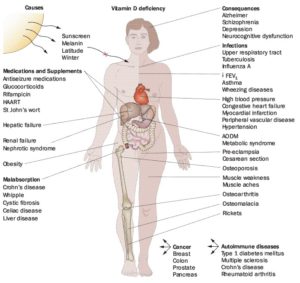Autoimmune diseases and vitamin D3
the use of high doses of vitamin D3
In the early 20th century were discovered substances called vitamins, A, B, C and so the next ingredient which had similar activity called vitamin D. It is a misnomer, as later found that this substance is actually Steco-steroid, a special group of hormones. But the name is in use kept up to date. But the name still retain to this day.
The man through many millennia has lived outdoors, so his body developed naturally.The sun has caused absorption vitamin D through the skin into the body. Only recently people spend most of their time indoors , so that over the years, their skin is very little time exposed to direct sunlight.Therefore, we should not be surprising that many studies show that 90% of people in the world are in a significant lack of vitamin D.
Vitamin D participates in the hundreds of chemical reactions in the cell. The substantial lack of it disables cell to function normally and can contribute to the development of autoimmune diseases such as:
Multiple sclerosis
Gullien Barre syndrome
Rheumatoid arthritis
Ulcerative colitis
Crohn’s disease
Hashimoto’s thyroiditis
Lupus
Diabetes
Scleroderma
Vitiligo
Problems of conceiving
and many others

About 15% of people when they are exposed to enough sunlight can not make enough vitamin D. This can occur because of insufficient activation of the vitamin in the liver and kidneys, because of disturbances in vitamin D receptors, missing protein that transports vitamin, genetic changes, etc. These people are particularly prone to autoimmune diseases. To all their tissues get enough activated vitamin D you need to take a significantly higher amount than the other people.
Prof .dr. Cicero Coimbra from Brazil with his team investigates the use of high doses of vitamin D for the autoimmune disease, the past twelve years.
Dr. Coimbra is physician – a specialist in neurology, with sub-specializations in internal medicine, Ph.D., assistant professor in the Department of Experimental Neurology, School of Medicine, University of Sao Paulo in Brazil.
Many studies have shown that vitamin D has immunomodulatory effects.
High doses of vitamin D increases the absorption of calcium from the foods we eat. Too much calcium in the blood can damage the kidneys and lead to dialysis. It is therefore essential that patients taking high doses of vitamin D strictly avoid foods rich in calcium. Such foods include all dairy products, all nuts such as walnuts, almonds, cashew and Brazil nuts, and seeds like sesame seeds, then so-called soya milk, oats, etc. And other food if they are fortified with calcium.
Calcium, which will still be in the blood, should be diluted because that does not get too concentrated passed through the kidneys and therefore need to drink 2-3 liters of water per day depending on the weight of the patient. You also need to avoid smoking and mental stress because it can reduce the effect of therapy.